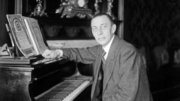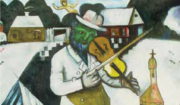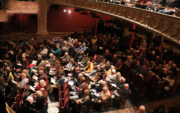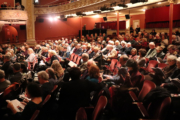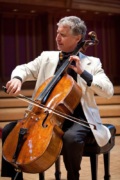Orientalia was the title of a slender début anthology of verse, published in 1913, by Marietta Shaginyan (1888–1982), a promising Symbolist poet of Armenian descent, born and educated in Moscow. Shaginyan dedicated Orientalia to the great Moscow Neo-Romantic composer, pianist, and conductor Sergei Rachmaninov (1873–1943), who was then about forty, married to Natalia Satina, with two daughters.
The question “What is Jewish music?” has provoked more than a few essays, books, and late-night, booze-soaked BS sessions among Jewish (and non-Jewish) musicians, composers, and people who write about Jewish music. An inquiry that should seem to be pretty straightforward turns out to be quite elusive, begging the question, do Irish musicians have such a hard time defining Irish music? What about Greeks? Persians? Chinese?
Shocking moments in music that, like an earthquake, changed the contour of the landscape for all future musical enterprise (Stravinsky’s The Rite of Spring, minimalism, John Cage, French aesthetic challenging German hegemony, the infusion of jazz and Latin vernacular into the classical stage, etc.) and often scandalized the public with their emergence.
Raise your hand if you know that 2017 marks the 100th anniversary of women’s suffrage in New York, as well as the 150th anniversary of the birth of Amy Beach, the first acclaimed American composer. Do I see any hands? Certainly you did not see mine. If I ever came across the name “Amy Beach,” I probably thought it was a strip of sand somewhere on the Jersey shore.
Being a participant in Close Encounters performances was a sublime experience for this old actress. It is a rare and happy circumstance to be asked to narrate a piece to music or around music and I was a lucky designate. What joy!
How many of us have heard that playing Mozart for a fetus in utero will increase his or her math skills? Or that piano (or other instrument) training increases IQ? Listening to and making music has become a subject of significant interest to neuroscientists over the past decade as it has become clear that studying and playing an instrument has significant positive effect on the brain of the player.
By Yehuda Hanani
Countless jokes surround the world of classical music. A clown steps onto the stage in concert gear and pushes a large piano from one corner towards a stool that stands at the other far end (highlighting the absurdity of life); Victor Borge extolling the usefulness of Chopin’s “Minute Waltz” as an egg timer; Charlie Chaplin stepping on his violin during an attempted recital (in Limelight), walking around the stage looking for it with the fiddle sitting on his foot like a large shoe. There are conductor jokes, viola jokes, opera jokes (A Night at the Opera with the Marx Brothers!) and on and on.
The overlapping proximity of music and comedy is far from new. For centuries minstrels and court jesters mixed music with jokes, tricks and dance in taverns (respectable and otherwise); bawdy songs accompanied ale and rum. The partnership of witty lyrics and music evolved into the operettas of Offenbach, the parodies of Gilbert and Sullivan, Flanders and Swann, burlesque and vaudeville, and composers like Erik Satie and P.D.Q. Bach (Peter Schikele) gave their works zany and outrageous titles: “Bureaucratic Sonatina,” “Flabby Preludes for a Dog” (Satie), “Concerto for Horn & Hardart,” “Chaconne á son gout” (P.D.Q. Bach). All of these forms of musical comedy were aided by props, pantomime, and mostly by words.
But how does music convey humor on its own, unaided by extra-musical elements? An examination of our arsenal of jokes will reveal that they fall into a number of categories and all of them, amazingly, can be expressed in music. Here are just a few examples:
SURPRISE-SHOCK: You lull the audience to sleep with a gentle, quiet tune ending with an unexpected loud chord (Haydn’s “Surprise” Symphony). Those familiar with the piece have the added pleasure of anticipation.
IMITATION-MIMICKING: Bird calls and “The Flight of the Bumblebee” (Rimsky Korsakov). In his “Midsummer Night’s Dream,” Mendelssohn includes braying noises at the moment Bottom is turned into a donkey, and in “Don Quixote” by Strauss, the Don and Sancho Panza meet a pair of monks impersonated by two bassoons chatting away in a nasal monastic “lingo.” The most popular comical imitations are found in Saint Saëns’ “Carnival of the Animals” and include a beginning piano student practicing his/her scales (an insufferable animal, indeed) and fossils represented by xylophones sounding like dry bones knocking together. The composer, concerned that his buffoonery and frivolity might damage his career, only allowed the publication of the dignified “Swan” during his lifetime. Of course, History judged differently….A most outrageous imitation is Rossini’s “Ricin” or Castor Oil depicting the result of taking the oil for constipation when runs on the piano turn onomatopoetically into other runs….
PARODY: In Mahler’s First Symphony (third movement), he makes use of the canon “Frère Jacques” turned into a minor key as a mock funeral march. It is based on the popular German children’s story “The Huntsman Burial” in which all four-legged animals follow the coffin and cats, toads and crows form a Bohemian band of musicians accompanying the procession.
SARCASM: Sardonic humor is Shostakovich’s trademark. In his Fifth Symphony, which was intended to get him back in favor with the regime, he still could not help making the tempo indication for the ending painfully slow. Many conductors consider it an error and finish the piece heroically, not realizing that Shostakovich’s intention was to undermine the climax—to rain on his own parade.
INTENTIONAL MISTAKES, GETTING LOST, COMING IN “WRONG” In Strauss’ “Till Eulen-spiegel,” we see the deflating of dramatic build-ups with a silly clarinet joke, with the composer behind the scenes musically “sticking his tongue out” at the establishment.
In special concerts this season, we’ll examine Haydn’s naughty mischief as well as celebrate Rossini’s sense of humor. The word scherzo means “joke” in Italian. It was introduced by Haydn and adopted by Beethoven, replacing the minuet in symphonies, quartets and elsewhere. With its surprise, caprice and playfulness, it served as a relief between more serious dramatic moments.
How wonderfully versatile and expressive music is, and how —like all great art in all its forms—illuminating it is of the human condition in all its tragedies and comedies. So as we celebrate the legacy of Rossini, consolidator of Italian opera who shaped it into what it became, let’s ponder some of his tantalizing titles: “Pretentious Prelude and a Nightmare”; “Prelude Inoffensive” and “Prelude Convulsive”; “Tormented Waltz,” “Love without Hope,” “Complaint in Two Voices,” and lest we forget — “Ouf, les petits pois.”

